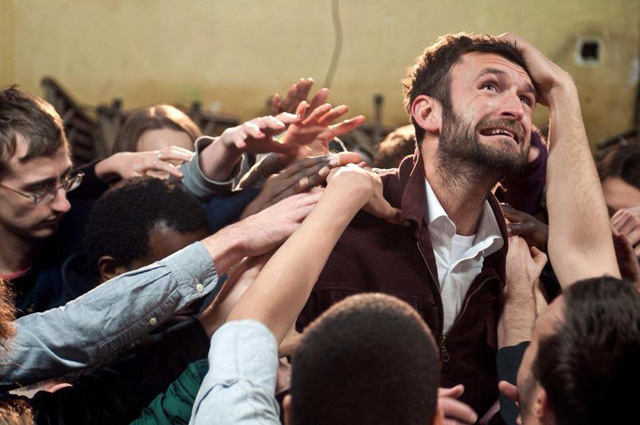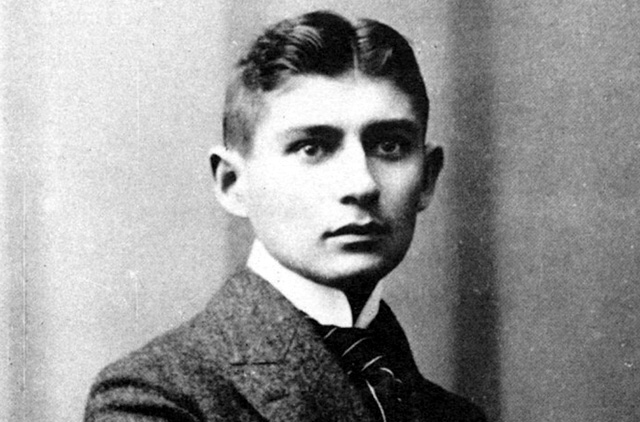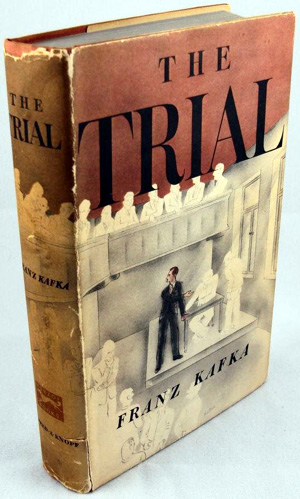I am in a garage in Hoxton on a Tuesday night. On the walls I can see my name scrawled in white chalk alongside other names which have been crossed out. A mound of burnt-out matches lies on the floor, and cowering next to my feet is a bedraggled man shining a torch in his face. The man asks for my name. I answer and ask for his. He replies “Josef K”. Now, most people would leave their questioning there. After all when someone tells you they share the name of the central protagonist of Kafka’s greatest ever novel, the immediate reaction is to nod encouragingly while secretly planning your escape.

But in the interests of ‘journalism’ and also because I’ve always wanted to know what the K stands for in Josef K’s name, I asked the actor in RETZ’s immersive production of The Trial what the K actually stands for. “The K…stands for Kafka!” I can’t blame the actor for thinking on his feet. In fact saying that the K in Josef K’s name stands for Kafka is arguably the most logical conclusion you could make. The original novel does explore preoccupations and relationships which can be related to Kafka’s life and many critics have suggested that Kafka’s nomenclature is biographical. However, the actor’s rash admission that Josef K is Kafka demonstrates everything that is wrong about this ambitious production.
In the novel, the fact that Kafka does not give Josef K a surname is hugely important. It stresses the ambiguity of the novel’s meaning. Is the work biographical? Or does Josef represent an everyman? Or can he really be an everyman if he still has a name? All these questions are raised by simply leaving the reader to imagine as much as possible.

In RETZ’s production, however, such ambiguity does not exist. They present a didactic adaptation of Kafka’s work which sets out to highlight how our individual identity is under threat in the age of the internet. Of course their message is a pertinent one, and does lend itself to the source material, yet by attempting to create evangelizing theatre they miss the whole point about Kafka. Kafka’s work was not trying to offer us meaning; it was offering us questions. What’s more, this attempt to pigeonhole Kafka into a single meaning is all the more disappointing given the huge potential of this talented theatre company’s original idea.
Setting the individual as both protagonist and audience member in The Trial is an inspired move. Suddenly your fellow audience members are no longer there to reassure you that you are watching a play. The streets of your everyday life become the stage allowing the play to intrude into your life, and as the play’s actors approach you in the street you begin to question who is a member of the public and who is a character in the play. The sense of isolation which is so important to the novel is thus brought to life by this ingenious theatrical device.
 Still, I can’t help feeling that RETZ does not use this ‘immersive’ theatre to its full effect. If the production really had placed the individual as the main protagonist, then the isolation and uncertainty that the production sought to create would have been achieved. However, rather than being Josef K, the production forces you to follow his journey. Your story in the adaptation is constantly referred back to Josef and thus any hope of actually being involved in the play is shattered. This move also allows RETZ to emphasise their didactic message yet again. For rather than enabling you to find your own interpretation of the play on your own journey, you are bombarded by the message which RETZ wants you to take home. It creates an arbitrary and reductive theatre, rather than an open, ambiguous one. However, leaving these criticisms aside, there are some very good performances. Victoria Broom as Leni, for example, is excellent as the surreal and ambiguous temptress-cum-saviour, and Peter Saracen is also good as The Pastor. Moreover the use of the landscape in the production is brilliant. I did not expect, for example, that the lawyer’s office would actually be in a proper office space, with the firm’s name emblazoned above the door; and the use of the civic buildings to emphasise the bureaucratic, unseen forces which are at play is also fantastic.
Still, I can’t help feeling that RETZ does not use this ‘immersive’ theatre to its full effect. If the production really had placed the individual as the main protagonist, then the isolation and uncertainty that the production sought to create would have been achieved. However, rather than being Josef K, the production forces you to follow his journey. Your story in the adaptation is constantly referred back to Josef and thus any hope of actually being involved in the play is shattered. This move also allows RETZ to emphasise their didactic message yet again. For rather than enabling you to find your own interpretation of the play on your own journey, you are bombarded by the message which RETZ wants you to take home. It creates an arbitrary and reductive theatre, rather than an open, ambiguous one. However, leaving these criticisms aside, there are some very good performances. Victoria Broom as Leni, for example, is excellent as the surreal and ambiguous temptress-cum-saviour, and Peter Saracen is also good as The Pastor. Moreover the use of the landscape in the production is brilliant. I did not expect, for example, that the lawyer’s office would actually be in a proper office space, with the firm’s name emblazoned above the door; and the use of the civic buildings to emphasise the bureaucratic, unseen forces which are at play is also fantastic.
Indeed, in spite of these criticisms, the production should be praised for its ambition and its concept. Although I was left feeling disappointed at the end of the play, it was more because this adaptation does not fulfil its potential rather than because it is wholly underwhelming. In fact it does offer an entertaining and enjoyable evening, and is definitely thought-provoking. So if your idea of fun is spending a night in a dingy garage in Hoxton with Josef K (and in truth whose isn’t?), pop down to Shoreditch Town Hall.
The Trial at Shoreditch Town Hall, 380 Old Street, London, EC1V 9 LT, until Saturday 27th April. Tickets £30. For more information and to book visit the website.



